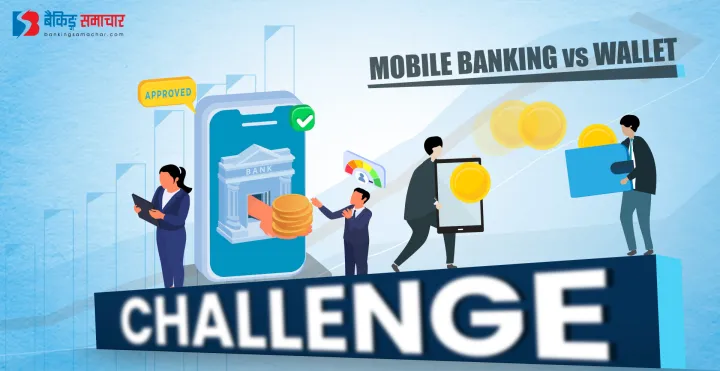KATHMANDU – The future of mobile wallet companies operating in Nepal is increasingly uncertain as commercial banks continue to expand their range of services. Banks have been providing digital banking services to their customers through mobile banking apps, putting the sustainability of over two dozen wallets at risk.
Currently, 26 wallet companies licensed by Nepal Rastra Bank are in operation. However, the licenses of two companies have been suspended after they were found to be involved in illegal gold smuggling. As a result, the central bank has frozen the operating accounts of Paywell Nepal and Easy Pay for investigation.
Despite these suspensions, 24 other wallet companies continue to serve their customers. However, the future of these wallets is in jeopardy as an analysis of user interests and transaction data shows a declining trend. Since 2009, when eSewa first introduced digital payment services in Nepal, the number of wallet providers has grown to 26, including the two with suspended accounts.
Wallets primarily offer digital payment facilities, allowing users to pay for services such as mobile recharge, electricity, water, bus and plane tickets, and school fees. The introduction of these services significantly reduced the queues for paying utility bills, and even traffic fines can now be paid through wallets.
However, as commercial and development banks, along with finance companies, have launched their own mobile banking apps, customers are increasingly using these apps for transactions instead of loading money into wallets. This shift poses a threat to the viability of wallet companies, which have been developed with investments totaling billions of rupees.
Mobile Banking: The User’s Choice
Nepal Rastra Bank data shows that mobile banking has become the preferred choice for users in the last fiscal year 2080/81. According to the central bank’s electronic transaction data, a total of NPR 3.73 trillion was transacted through mobile banking in the last fiscal year.
In contrast, only NPR 31.3 billion was transacted through wallets, which is NPR 3.42 trillion less than the amount transacted via mobile banking. Wallets also lag behind in the number of transactions, with only 31.2 million transactions compared to 45.6 million through mobile banking.
Breakdown of Transactions by Method
Electronic payments in Nepal are conducted through 15 different means. For instance:
- NPR 64.51 trillion was transacted through RTGS (Real Time Gross Settlement).
- NPR 91.26 billion through ATMs.
- NPR 6.72 trillion through electronic check clearing (ECC).
- NPR 3.59 trillion through the Interbank Payment System (IPS).
- NPR 6.66 trillion through Connect IPS.
Additionally:
- NPR 95.26 billion was transacted through debit cards.
- NPR 2.7 billion through credit cards.
- NPR 76 billion through prepaid cards.
- NPR 17.73 billion through internet banking.
- NPR 1.64 billion through branchless banking.
- NPR 61.73 billion through the QR-based payment system.
- NPR 5.92 billion through Point of Sales (POS).
- NPR 91 billion through e-commerce.
Wallet Companies’ Perspective
Vinay Khadka, Chief Executive Officer of Khalti, acknowledges that mobile wallets need to change their business strategy. In a conversation with Banking News, Khadka stated, “There is no comparison between mobile banking and wallets.” He admitted that the challenges for wallets are increasing, especially since mobile banking is required to load money into wallets, and many tasks performed by wallets can now be done through mobile banking.
Roshan Sigdel, head of business and marketing at MyPay, also emphasized the need for wallets to adapt their business strategies. He added that the central bank should support business expansion and innovation within the sector.
The State of Wallet Companies
According to Nepal Rastra Bank, a total of 26 companies have received wallet licenses, operating as Payment Service Providers (PSP). Additionally, 9 companies have obtained Payment System Operator (PSO) licenses. Despite this, only a few of these companies have been providing services professionally after receiving their operating permits.
Increasing Adoption of Electronic Payments
Overall, electronic payment transactions in Nepal are on the rise, even as the number of mobile banking users continues to grow. The number of wallet users increased by 23.86 percent in the last fiscal year 2080/81, reaching 23.46 million. Meanwhile, the number of mobile banking users surged by 58.03 percent to 24.6 million during the same period.
There has also been a significant increase in QR-based payments, with the number of transactions growing by 113.20 percent to 2.825 million. This data indicates that customers are increasingly becoming accustomed to electronic payments.



 About Us
About Us
Comment